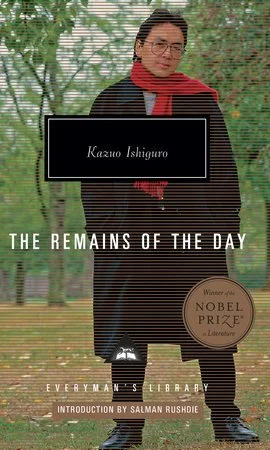Books
One day, this page will contain the books I’ve written. Until then, I’ll focus on the books I’m currently reading or that left a mark on me. It’s not a full catalogue, but a view into the authors, stories, and characters who inspire me.
The Remains of the Day
By: Kazuo Ishiguro
I didn’t pick up The Remains of the Day to understand British class dynamics, postwar memory, or the consequences of moral complicity, though I now have a deeper appreciation for all three. I picked it up because Ishiguro had just won the Nobel Prize, and I was curious to see what the fuss was all about. What I found was an author that wrote with such restraint and grace that every other novel by any other author felt ham-handed and loud. Indeed, for a longer time than I care to admit, Ishiguro nearly ruined fiction for me. Such is the power of his soft touch, quiet heartbreak, and muted longing.
Despite its period setting, I'm not aware of a better modern text on masculinity, loyalty, and duty, than The Remains of the Day.
The Spirit Catches You and You Fall Down
By: Anne Fadiman
Anne Fadiman's The Spirit Catches You and You Fall Down was published twenty years prior, almost to the day, from when I first read it in 2017. Fadiman gives the account of Lia Lee, the young epileptic daughter of Hmong refugees living in California, and the ethical, clinical, and cultural challenges faced in treating her condition. The book toggles between the story of Lia Lee, and the broader history of the Hmong people and US government involvement in Laos. The book was particularly important to me because I was living in Laos at the time and working with Hmong people.
"Cultural competency" is a phrase that gets thrown around a lot these days, especially on job and school applications. Just about anyone can claim it as a personal attribute, and it would be a difficult claim to dispute. As a result, it carries little weight. It's almost meaningless.
Fadiman's Spirit is a stark reminder that cultural competency isn't just a throwaway line on a resumé. It can mean the difference between prosperity or struggle, community or isolation, or as in the case of Lia Lee, life or death.
Republic, Lost
By: Lawrence Lessig
A seminal book in the development of my own political philosophy, Republic, Lost clearly and systematically articulates how the influence of money in politics erodes trust in government. Searingly true in 2011, the implications of that government distrust have reaped a decade+ of escalating polarization, populist insurgencies, institutional dysfunction, and the erosion of democratic norms. While his presidential run turned out to be considerably less compelling, Lessig’s Republic, Lost is required reading.
The Prosperity Paradox
By: Clayton Christensen, Efosa Ojomo, Karen Dillon
As this year sees the world’s richest governments retreat from funding aid and global development, this book from the late Clayton Christensen has never been more important. While Christensen undersells how involved global development funders were in spurring markets (read: extremely involved) the overarching thesis of this book is hard to refute — that it is market creating innovations and investment which lead poor countries to become rich countries. “Fall in love with people’s problems, study them, find out what they are, what the Job is, and innovate solutions (not just resources) to those struggles. From there, the path to market creation becomes predictable, and the road to prosperity has begun.”



